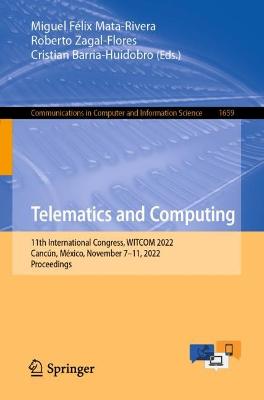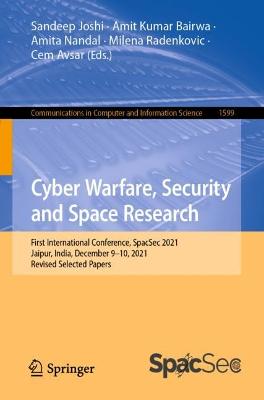Telematics and Computing
 portes grátis
portes grátis
Telematics and Computing
13th International Congress of Telematics and Computing, WITCOM 2024, Mazatlan, Mexico, November 4-8, 2024, Proceedings, Part II
Zagal-Flores, Roberto; Mata-Rivera, Miguel Felix; Barria-Huidobro, Cristian
Springer International Publishing AG
12/2024
317
Mole
9783031772924
Pré-lançamento - envio 15 a 20 dias após a sua edição
.- Communications link delay analysis for a swarm of UAVs using fading channel models.
.- Analysis of digital signal processing algorithms and their implementation in hardware and embedded software.
.- Compact Encryption Scheme Based On Cellular Automatas.
.- Artificial Vision Bottle Separator Machine.
.- Design of a parallel algorithm for the detection of classic facial expressions.
.- Generating Universum Instances from Variational Autoencoder Latent Space for Semi-Supervised Learning.
.- Analysis of the EfficientNet Architectures for Flower Classification.
.- Robustness evaluation of CNN models trained without backpropagation.
.- Geospatial raster data processing appliying neural networks.
.- Prototype application for Mexico City's integrated mobility system, using the Dijkstra algorithm and developed in Flutter.
.- A hybrid simple filter-wrapper feature selection approach for microarray classification.
.- Multiclass classification of ECG signals using a LSTM network trained with spectral features.
.- Deep Learning-based Resource Utilization Prediction for Multi-Pod Applications in Kubernetes.
.- Embedded Electronic System for Sudden Infant Death Prevention in Crib Babies.
.- A Machine Learning Classification to Modeling Undocumented Migration from Mexico to the United States.
.- Variables monitoring system of NFT hydroponic strawberry cultivation.
.- Exploring Mexican Voting Intention through Spatiotemporal Trends using Social Media and Open
Data Analysis.
.- The Role of Generative Artificial Intelligence in Educational Innovation.
.- Analysis of Emotion Recognition Methods: A Systematic Mapping of the Literature.
.- Communications link delay analysis for a swarm of UAVs using fading channel models.
.- Analysis of digital signal processing algorithms and their implementation in hardware and embedded software.
.- Compact Encryption Scheme Based On Cellular Automatas.
.- Artificial Vision Bottle Separator Machine.
.- Design of a parallel algorithm for the detection of classic facial expressions.
.- Generating Universum Instances from Variational Autoencoder Latent Space for Semi-Supervised Learning.
.- Analysis of the EfficientNet Architectures for Flower Classification.
.- Robustness evaluation of CNN models trained without backpropagation.
.- Geospatial raster data processing appliying neural networks.
.- Prototype application for Mexico City's integrated mobility system, using the Dijkstra algorithm and developed in Flutter.
.- A hybrid simple filter-wrapper feature selection approach for microarray classification.
.- Multiclass classification of ECG signals using a LSTM network trained with spectral features.
.- Deep Learning-based Resource Utilization Prediction for Multi-Pod Applications in Kubernetes.
.- Embedded Electronic System for Sudden Infant Death Prevention in Crib Babies.
.- A Machine Learning Classification to Modeling Undocumented Migration from Mexico to the United States.
.- Variables monitoring system of NFT hydroponic strawberry cultivation.
.- Exploring Mexican Voting Intention through Spatiotemporal Trends using Social Media and Open
Data Analysis.
.- The Role of Generative Artificial Intelligence in Educational Innovation.
.- Analysis of Emotion Recognition Methods: A Systematic Mapping of the Literature.







